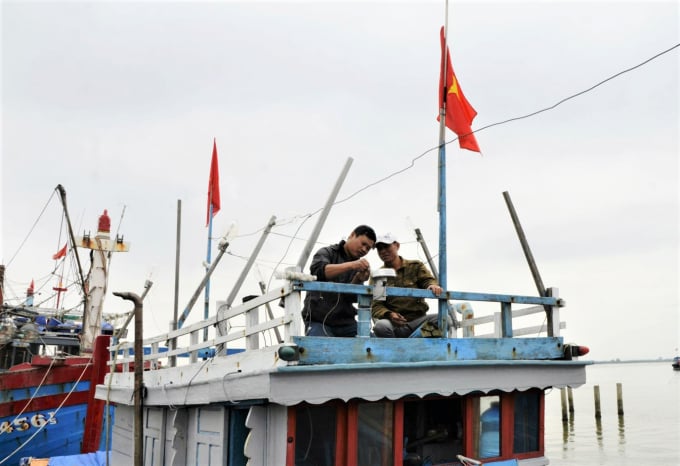November 28, 2025 | 11:43 GMT +7
November 28, 2025 | 11:43 GMT +7
Hotline: 0913.378.918
November 28, 2025 | 11:43 GMT +7
Hotline: 0913.378.918

Information technology helps track fishing fleets by using satellites
Almost four years since the European Commission (EU) imposed yellow card on Vietnamese seafood for failing to cooperate in fighting Illegal, Unreported and Unregulated (IUU) fishing, Vietnam has not yet got fishing yellow card removed.
Apart from good management of fishing fleets, seafood traceability is also an important step to get the card removed. However, it's difficult because infrastructure facilities for deep-sea and off-shore fishing have been not invested properly .
In recent years, fishing ports and anchorages in Vietnam were planned according to the Decision No.1976/QĐ-TTg of the Prime Minister. By the end of 2015 there were a total of 125 fishing ports and 146 anchorages planned.
Vietnam has so far invested in building additional 90 fishing ports but only 65 of them were put into operation and 49 ports were recognized as meeting the standards of seafood traceability for export.
According to Nguyen Van Trung, Director of Fisheries Department at the Directorate of Fisheries, under the Ministry of Agriculture and Rural, the number of fishing ports in Vietnam currently reaches only 50% of the target.
"Both Government and National Assembly have recently paid great attention to the issue. This is the bottleneck that needs to be dealt with to ensure seafood traceability contributing to combat IUU fishing as required by the EC," said Nguyen Van Trung.
The representative of the Directorate of Fisheries said Vietnam is now focusing on investing in fishing infrastructure facilities with the fund from the medium-term public investment plan for the 2021-2025 period, from ODA and foreign concessional loans and from social capital.
Additionally the application of information technology to the management and control of seafood quality is also considered the inevitability amid labor shortage. Previously, daily journal of each fishing fleet in the form of a diary was recorded by the captain then the diary was handed to the management board of fishing port along with the batches of seafood which were then shipped to processing plants or to importers.
With advanced information technology, fishing fleets can now be tracked by using satellites and all data of fishing ports, batches of seafood can be saved and integrated in a digital diary. Thereby, accuracy, reliability, and objectivity are guaranteed and at the same time fishermen can save time and effort.
Accordingly the Ministry of Agriculture and Rural Development has invested and assigned the Directorate of Fisheries to preside over developing software to monitor fishing vessels through the use of information technology. It's expected that the system will be put into use by the end of 2021.
Apart from the investment in infrastructure facilities and tools Nguyen Van Trung said it's necessary to invest in labor force at ports so that they can meet the requirements in terms of quantity and skills.
"In addition, all fishing ports need to come to an agreement on the management method to ensure synchronicity across the operations."
Translated by Mai Tham

(VAN) The TH Group is not only Vietnam’s leading clean-milk producer; it is also leaving a strong mark on sustainable development as it pursues the goal of carbon neutrality.
/2025/11/27/3830-1-152901_403.jpg)
(VAN) Dong Nai is developing its key crop areas, expanding planting area codes, and applying high technology to increase the value of agricultural products, aiming at a green and sustainable agriculture.

(VAN) Tay Ninh’s livestock sector is undergoing a major transformation, applying high-tech, closed-loop circular models to build sustainable value chains.
/2025/11/26/3627-4-082628_818.jpg)
(VAN) From a small café on the red basalt highlands, Le Van Hoang started a business with clean coffee, building Enjoi Coffee into a symbol of organic agriculture in the Lam Dong plateau.
/2025/11/25/0045-1-135246_13.jpg)
(VAN) Ca Mau is researching a model of sea-encroaching embankments combined with viaducts and logistics service zones, aiming both to prevent erosion and create land funds for marine economic development.

(VAN) The information was shared at the seminar 'Urban Agriculture - Solutions for Developing Green Spaces,' organized by the Kinh te & Do thi Newspaper and the Biotechnology Center of Ho Chi Minh City.
/2025/11/19/4141-2-132831_216.jpg)
(VAN) One of Japfa's outstanding solutions is implementing digital transformation and artificial intelligence (AI) to optimize operations, enhance productivity, and advance sustainable development.